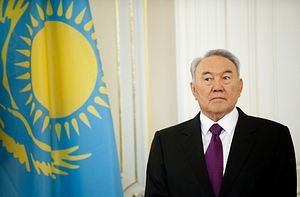Kazakhstan is a young state with a dual history: both Kazakh and Russian. The two histories are intertwined even if Astana may wish it weren’t so. And in recent years, as Russian revanchism spilled over its borders into both Georgia in 2008 and Ukraine in 2014, Kazakhstan has taken steps to define its own unique place as a state.
The recent trial and conviction of Yermek Narymbayev and Serikzhan Mambetalin, a pair of Kazakh activists, illustrated not only the arbitrariness of Kazakh justice but a facet of Astana’s drive to control messaging regarding the image of the state and its unity of thought. The two, after all, were sentenced to three and two years respectively for “inciting national discord” through Facebook posts. Mambetalin’s early release pending appeal and statement of repentance only underscore that conclusion.
Joanna Lillis, who has been following the trial from Almaty for Eurasianet, wrote in early January that the two activists were “active online dissenters, but wield little on-the-ground influence to rally crowds against the government…” (read the rest of her writing regarding the trial and fallout here and here). Small players or not, the trial and easy conviction certainly sends a powerful message to Kazakhs to keep quiet if they have criticisms of the state.
As reported by RFE/RL, Mambetalin’s release came along with a letter posted to Facebook “in which he wrote that he was ‘guilty and sorry for his mistakes,’ adding that he ‘committed the crime unintentionally.’” As Lillis noted, it was quite the change from the trial in which he plead not guilty, denounced the proceedings, and made a lively defense which cited the shuttering of opposition parties and media outlets as leaving Kazakhs with only the Internet to voice their opinions.
But the only opinions Astana is keen to hear are those praising the state and the president.
In unrelated news, though decidedly linked in the impression it makes, Kazakh police have reportedly detained a prominent, and pro-Russian, businessman in Shymkent over the weekend. Tokhtar Tuleshov has had his hands in a number of pies; Reuters says he is the chief executive of one of the country’s largest breweries and owns business assets in horses and watches. Reuters also reported that Tuleshov has run the Kazakh office for the Russia-based Center for the Analysis of Terrorist Threats, writing that “Its website catu.kz published anti-Western and pro-Russian articles, such as a piece alleging Islamic State militants were sending reinforcements to Ukrainian nationalists.”
On one hand, Astana wants to be understood as a state with a long and independent history of its own. On the other hand, Nazarbayev was a direct product of the Soviet system (as are the institutions of the modern Kazakh state). If the praise slathered on Nazarbayev during a recent party congress is any indication, his cult of personality is growing to astounding levels. One speaker, per a video from RFE/RL’s Kazakh service, said to Nazarbayev: “You are a figure who raises us and protects us all, like baby birds.”
































